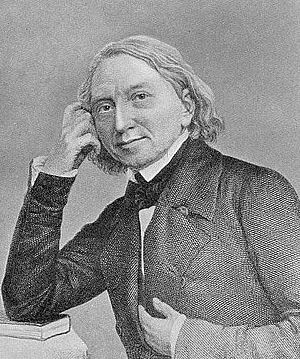Karl Lachmann facts for kids
Karl Konrad Friedrich Wilhelm Lachmann (born March 4, 1793 – died March 13, 1851) was an important German philologist and critic. A philologist studies language and literature, especially old texts. Lachmann is famous for his big contributions to textual criticism. This is the skill of figuring out the most accurate original text from old copies.
Contents
About Karl Lachmann
Karl Lachmann was born in Brunswick, which is now in Germany. He studied at the universities of Leipzig and Göttingen. He focused mainly on studying languages and old writings. In 1811, while at Göttingen, he helped start a group for critical studies with some friends.
In 1815, he joined the Prussian army as a volunteer. He went with his group to Paris but did not fight in any battles. The next year, in 1816, he became an assistant teacher at a school in Berlin. He also started teaching at the university there. Later that summer, he became a main teacher at a school in Königsberg. He helped his friend, Friedrich Karl Köpke, with a book project.
In 1818, Lachmann became a professor of classical philology at the University of Königsberg. At the same time, he began teaching about old German grammar and poets from the Middle Ages. For the next seven years, he studied these topics very deeply. In 1824, he took time off to visit libraries in Germany. He was looking for more materials for his studies.
In 1825, Lachmann became a professor at the Humboldt University in Berlin. He became a full professor in 1827. In 1830, he was made a member of the Academy of Sciences. Karl Lachmann passed away in Berlin in 1851.
Why Karl Lachmann Was Important
Lachmann is a very important person in the history of German philology. He changed how people studied old texts and languages.
Early in his career, Lachmann translated a book about old Scandinavian stories. In his early writings, he set down important rules for textual criticism. He also explained how Middle High German sounds and poetry worked. This was a big step forward in understanding old German.
His scientific way of working became clearer in his later books. These included a collection of German poets from the 13th century (1820). He also edited famous works like Hartmann's Iwein (1827) and poems by Walther von der Vogelweide (1827). He also edited Wolfram von Eschenbach's works (1833). His edition of Der Nibelunge Not und die Klage (1826) was also very important.
His Ideas on Homer's Iliad
Lachmann also wrote about Homer's Iliad. He thought that the Iliad was made up of eighteen different parts. He believed these parts were put together and changed over time. His ideas were very influential in the 1800s. However, today, most scholars do not agree with his views on the Iliad.
His Work on the New Testament
His smaller edition of the New Testament came out in 1831. He wanted to create a more reliable Greek version of the New Testament. He was the first major editor to move away from the commonly used Textus Receptus. He tried to find the oldest readings from ancient manuscripts.
His Greatest Achievement
Perhaps Lachmann's greatest scholarly achievement was his edition of Lucretius (1850). He worked on this book from 1845. He showed how three main old copies of Lucretius's work all came from one single older copy. He even figured out that this older copy was a copy of an even older manuscript. Scholars like HAJ Munro said this work was a "landmark" for anyone studying Latin.
Lachmann also edited many other classical writers. These included Propertius (1816), Catullus (1829), and Tibullus (1829). He also translated some of Shakespeare's sonnets (1820) and his play Macbeth (1829).
See also
- Lachmann's law
 In Spanish: Karl Lachmann para niños
In Spanish: Karl Lachmann para niños
 | Precious Adams |
 | Lauren Anderson |
 | Janet Collins |


